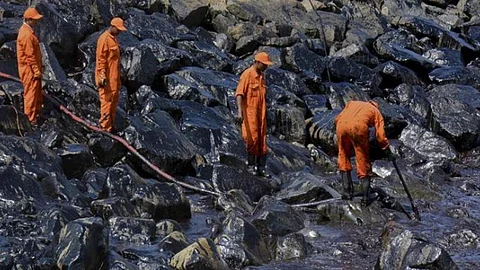
- Topics
- Feature
- Opportunities & Events
- Data
- Hindi Portal
- Topics
- Feature
- Opportunities & Events
- Data
- Hindi Portal

According to a report of the National Centre for Sustainable Coastal Management (NCSCM) on the oil spill in Ennore from the collision of two cargo ships, the flora and fauna of the region are recovering slowly after the spill. Also, the report has classified the impact of the oil spill into various impact zones and the high impact zone is found to be between Ennore and Marina beach. Moreover, across all these zones, Olive Ridley turtles were found to be affected although their mortality has not been correlated with the spill.
The last free-flowing river in Karnataka which is also a rich and highly productive estuary, Aghanashini is under threat as the Karnataka State Industrial and Infrastructure Development Corporation (KSIIDC) has proposed to build a multipurpose estuarine port. Neglecting all the livelihood concerns of the locals, the state government has decided to go ahead with the proposal. The draft assessment report is also being severely criticised as it lacks consideration of the ecology and economic productivity of the estuary.
According to a three-year-long study conducted by World Wildlife Fund (WWF) India, water from the Bhavani river is no longer safe for consumption. The study has also revealed that the upper reaches of the Bhavani and the Moyar rivers have been polluted by both Udhagamandalam and Coonoor municipalities and industries including a government-owned factory. Moreover, the hydel projects have also converted the entire river stretch in Mettupalayam into a stagnant cesspool. However, the state authorities have claimed that notices have been sent to the industries for setting up zero liquid discharge units within a month.
As per the water quality index test conducted by the Karnataka State Pollution Control Board (KSPCB) on 77 lakes across the state, 71 lakes are in a very poor condition. Out of 77 lakes, 38 are in Bengaluru and all of them have fared badly in the test. According to environmentalist A. N. Yellappa Reddy, all kinds of waste are let into the lake and the state lacks a proper mechanism to monitor the inflow of waste into these lakes.
As per the central government, over 12,000 suicides have been reported in the agricultural sector every year since 2013. Despite the adoption of a multipronged approach to improving the income and social security of farmers, incidents of suicides continue in the farming sector. With over 4,200 suicides, Maharashtra has topped the list, followed by Karnataka, Telangana, Madhya Pradesh, Chhattisgarh, Andhra Pradesh and Tamil Nadu. Together these states have contributed to 87.5 percent of total suicides in the farming sector in the country.
This is a roundup of important news from May 2 - 7, 2017. Also, read the policy matters this week.